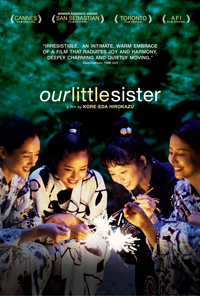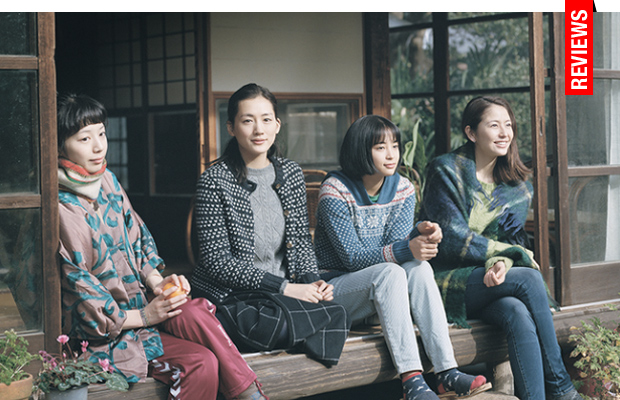Reviews
Our Little Sister | Review
Sisters Doing It For Themselves: Kore-eda’s Continued Examination of Polite Familial Discord
 Japanese auteur Hirokazu Kore-eda returns with Our Little Sister (aka Umimachi Diary), another entry in his continued exploration of slightly strained familial connections. Only, the accent on his latest is on the ‘slight.’ An opening line to a famous piece of literature asserts that all happy families are the same, a phrase that more or less applies to the strangely well-adjusted alternative option on display here. Kore-eda seems determined to denude a scenario of blatant sentimental tendencies by remaining vague on the exact details causing this unique formation, yet the film often plays like a warm yet inescapably modest account of emotions often hyperbolized. In the end, the film feels like a sight trifle from Kore-eda, though fans of the director’s work should certainly enjoy it.
Japanese auteur Hirokazu Kore-eda returns with Our Little Sister (aka Umimachi Diary), another entry in his continued exploration of slightly strained familial connections. Only, the accent on his latest is on the ‘slight.’ An opening line to a famous piece of literature asserts that all happy families are the same, a phrase that more or less applies to the strangely well-adjusted alternative option on display here. Kore-eda seems determined to denude a scenario of blatant sentimental tendencies by remaining vague on the exact details causing this unique formation, yet the film often plays like a warm yet inescapably modest account of emotions often hyperbolized. In the end, the film feels like a sight trifle from Kore-eda, though fans of the director’s work should certainly enjoy it.
Three grown sisters living in their grandmother’s house are united with a younger half-sibling they never knew they had. Elder sibling Sachi (Haruku Ayase) harbors the most resentment for their father, whose affair with another woman caused their mother (Shinobu Ohtake) to desert them all, forcing her to care for her siblings. Her younger two sisters (Masami Nagasawa; Kaho) seem more open to reconnecting with her father’s surviving family, which includes their thirteen year sister Suzu (Suzu Hirose). Upon meeting Suzu, now left alone with a stepmother (her mother is no longer in the picture), Sachi immediately invites Suzu to come live with them. Meanwhile, another family event causes more potential upheaval when they learn their mother will attend.
Our Little Sister is Kore-eda’s first film from a female perspective since 2009’s Air Doll. But following on the heels of Like Father, Like Son (2013) and I Wish (2011), this feels like familiar territory from the director. Rather than focus specifically on formative experiences of childhood, this title is all about the latent ramifications of past events still being processed.
Kore-eda seems content ignoring most of the uncomfortable details surrounding this family formation, instead focusing on present tense reunions in the form of funerals, memorial services, and home cooked meals. As such, a handful of poignant moments come few and far between, sometimes lost in a cumbersome running time. Sachi’s reluctant reconnection with her estranged mother, for instance, carries a weighty potential. But more often than not, we’re focused on the trio of older sisters and their rather saccharine sweet connection with their adolescent half-sister. Stolen childhood and repetitive cycles abound, finding Sachi exactly in the type of situation that she do heartily criticized her father and Suzu’s mother for. This irony plays out and is handled a bit too conveniently, however. Sachi’s other two sisters are characterized with less finesse, particularly Chika, who has little memory of her father, pleased to learn from Suzu she shared a love for fishing with him.
Based on a manga by Akimi Yoshida, the scenarios sometimes feel a bit trite in Kore-eda’s adaptation. Some notable actors pop up in the supporting male performances, such as Ryohei Suzuki and Ryo Kase, but neither are given much to do besides provide baggage for the sisters.
Kore-eda reunites with DoP Mikiya Takimoto from Like Father, Like Son, and the film feels warmly shot, with careful attention particularly paid to the actors. But as nothing feels particularly bothersome about Suzu and her successful assimilation into her new potentially awkward environment, Our Little Sister plays like one of those stories memorable to only those directly involved.
Reviewed on May 13 at the 2015 Cannes Film Festival – Main Competition. 128 Mins.
★★★/☆☆☆☆☆
Los Angeles based Nicholas Bell is IONCINEMA.com's Chief Film Critic and covers film festivals such as Sundance, Berlin, Cannes and TIFF. He is part of the critic groups on Rotten Tomatoes, The Los Angeles Film Critics Association (LAFCA), the Online Film Critics Society (OFCS) and GALECA. His top 3 for 2021: France (Bruno Dumont), Passing (Rebecca Hall) and Nightmare Alley (Guillermo Del Toro). He was a jury member at the 2019 Cleveland International Film Festival.






















